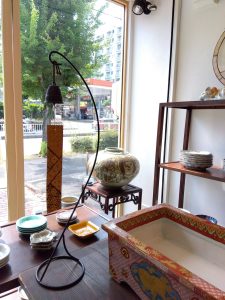6月と言えば・・・(愛知県名古屋市千種区姫池通 骨董買取 古美術風光舎)
2024.06.01
皆さまこんにちは、スタッフTでございます。
昼間の日差しがとても暑く感じる名古屋です。街ゆく人々も、一気に夏らしい装いの方が多くなった気がします。店内には、入り込む風が爽やかに感じる風鈴が、いよいよ出番が来たぞと存在感を表しております。

さて、本日から6月ですね。
6月といえば、さくらんぼや梅が旬を迎えたり、紫陽花が美しく咲いたりする時期ですね。父の日やボーナスなどの楽しみもある中、お気づきの方もいらっしゃることと思いますが、一年のなかで唯一祝日のない月なのです。平日が真っ黒な数字ばかりのカレンダーは気分も上がりませんね。
しかし、「6月と言えば?」と聞かれて思い浮かべることといったら、ほとんどの方が「梅雨」「雨」ではないでしょうか。毎年乾かぬ洗濯物にイライラし、濡れる足元に憂鬱になるこの時期ですが、先日傘を新調したので、その出番が来てほしいと、じつは雨はまだかと楽しみにしているところです。
ここで豆知識。天気予報の「降水確率0%」は、「ゼロパーセント」ではなく「レイパーセント」と読まれていることにお気付きでしたか?「ゼロ」は「皆無」ですが、「レイ」には「きわめて小さい」という意味が含まれるため、「降水確率0%」でも雨が決して降らないわけではありませんよ。
そしてぱっと思い浮かぶのは「ジューン・ブライド」。
「ジューンブライド」は「6月(June)の花嫁(Bride)」という意味です。「6月に結婚した花嫁は幸せになれる」という言い伝えがあり、6月に結婚するカップルがたくさんいます。
ジューンブライドの起源は西洋にあるとされています。諸説ありますが最も有名なのは、ローマ神話の主神ユーピテル(Jupiter。英語読みでジュピター)の妻で、女性の結婚生活を守護するユノ(Juno。英語読みでジュノ)が6月を守っているからというもの。ユノは女性の守護神であり、結婚や出産を司る最高位の女神。その女神が守っている6月に結婚した花嫁は、生涯幸せな結婚生活を送ることができるとされたのです。なお、6月を英語で「June」というのも、6月を守る女神「Juno」に由来します。
そして6月と言えば「衣替え」。ですが最近の学校では、明確に6月1日を衣替えとせず、個人の体調に合わせて服装を変えてよいので、あまり6月と言えば・・・に当てはまらないかもしれませんね。
衣替えは、平安時代に中国から伝わった習わしです。宮中行事として、年に2回、衣を替えるようになりました。当初は「更衣(こうい)」といいましたが、「更衣」という言葉が女官の役職名に用いられるようになったため、「衣更え(衣替え)」と呼ばれるようになったようです。
江戸時代になると着物の種類が増え、気候に合わせて年に4回の衣替えが武家社会で定められ、庶民にも広がっていきました。やがて明治時代に洋服が取り入れられると、役人や軍人などが制服を着るようになり、暦も新暦に変わったため、夏服と冬服を年に2回替えるようになり、この衣替えの意識が学校や家庭にも浸透し、現在に至っています。
今は合理的な収納のおかげで、服の入れ替えをしない家庭もあります。また、エアコンが整っているので、1年中同じような格好の方もいるかもしれませんね。ですが、衣替えを通じて衣服の季節感を養ったり、衣服の手入れ・管理・整理整頓のしかたを身につけたりするには実はとてもよい機会。衣替えは単なる家事ではなく、暮らしの行事として、季節ごとに繰り返すことによって、子ども達も学べるよい機会になります。
雨で外出の機会も減ることでしょうし、湿気もあって埃もたたないでしょうから(笑)お片付けにはもってこいかもしれません。無くしたと思っていた品が思いもよらず見つかるかもしれませんよ。
ではでは、また。

Hello everyone, this is Staff T.
The daytime sun is very hot in Nagoya. I feel that many people on the streets are now wearing summer-like clothes. In the store, wind chimes, which make you feel the fresh breeze coming in, are showing their presence as if it is finally their turn to come out.
Today is the first day of June.
June is the time of year when cherries and plums are in season and hydrangeas are in beautiful bloom. Amidst all the fun of Father’s Day and bonuses, some of you may have noticed that this is the only month of the year without a national holiday. A calendar with weekdays full of black numbers doesn’t lift our spirits either.
However, when asked “What do you think of June? I am sure that most people think of “rainy season” and “rain” when asked “What do you think of June? Every year I get frustrated with laundry that never dries and depressed with wet feet, but since I bought a new umbrella the other day, I am actually looking forward to the rain.
Here is a trivia. Did you notice that “0% chance of precipitation” in the weather forecast is read as “ray percent,” not “zero percent”? Zero” means ‘nothing,’ but ‘ray’ means ‘very little,’ so a ‘0% chance of precipitation’ does not mean that it will never rain.
And “June Bride” comes to mind immediately.
June Bride” means ”June Bride. Many couples get married in June because of the legend that “brides who get married in June will be happy.
The origin of June Bride is believed to be in the West. There are various theories, but the most famous is that Juno (Juno in English), the wife of the Roman god Jupiter (Jupiter in Roman mythology) and protector of women’s marital life, protects the month of June. Juno is the patron goddess of women and the highest-ranking goddess in charge of marriage and childbirth. It was believed that brides who married in June, the month protected by the goddess, would enjoy a happy married life for the rest of their lives. The English word “June” is derived from “Juno,” the goddess who protects the month of June.
June also means “change of clothes. However, in schools these days, June 1 is not clearly designated as a change of clothes, and students are allowed to change their clothes according to their personal physical condition, so the month of June may not be so much associated with….
The custom of changing clothes was introduced from China in the Heian period (794-1185). It became a courtly custom to change clothes twice a year. Initially, it was called “koi” (changing clothes), but as the word “koi” came to be used as a title for female courtesans, it came to be called “koroshie (changing clothes)”.
In the Edo period (1603-1867), the number of types of kimono increased, and changes of clothes four times a year were prescribed in the samurai society according to the climate, which spread to the general population. When western-style clothing was introduced in the Meiji period (1868-1912), officials and military personnel began to wear uniforms, and the calendar was changed to the new calendar, so summer and winter clothing was changed twice a year.
Nowadays, thanks to rational storage, some families do not change their clothes. Also, with air conditioning in place, some may dress the same way all year round. However, changing clothes is actually a great opportunity to develop a sense of seasonality in clothing and to learn how to care for, manage, and organize clothes. Changing clothes is not just a chore, but an event in daily life, and by repeating it season after season, children will have a good opportunity to learn.
The rain will reduce the chances of going out, and the humidity will keep the dust at bay (laughs), so it may be a good time to clean up. You may unexpectedly find an item you thought you lost.
See you soon.
*******************
ご実家の整理やお片付けなどをされている方のご相談などが多くございます。
お片付けなどくれぐれもご無理のないようになさってくださいませ。
風光舎では古美術品や骨董品の他にも絵画や宝石、趣味のお品など様々なジャンルのものを買受しております。
お片付けをされていて、こういうものでもいいのかしらと迷われているものでも、どうぞお気軽にご相談下さいませ。
また風光舎は、出張買取も強化しております。ご近所はもちろん、愛知県内、岐阜県、三重県その他の県へも出張いたします。
まずは、お電話お待ちしております。
愛知県名古屋市千種区姫池通
骨董 買取【古美術 風光舎 名古屋店】
TEL052(734)8444
10:00-18:00 OPEN

